February 6, 2023 — The U.S. Astronaut Hall of Fame will celebrate the careers of two space shuttle pilots, one who flew at the start of the program and another who helped bring it to a close almost 30 years later.
Retired Major General Roy Bridges and Senator Mark Kelly have been chosen as the 2023 Astronaut Hall of Fame inductees. The two will be enshrined during a public ceremony at NASA's Kennedy Space Center Visitor Complex in Florida on May 6.
"This year's class is another example of excellence from our space program," Curt Brown, chairman of the Astronaut Scholarship Foundation, former NASA astronaut and 2013 inductee in the Hall of Fame, said in a statement released on Monday (Feb. 6). "Both Kelly and Bridges represent the committed spirit of exploration, bravery and teamwork that make our space program a continued success. We are proud and honored to have them join the ranks of the space pioneers recognized in the United States Astronaut Hall of Fame."
Selected by NASA in 1980 and 1996, respectively, Bridges and Kelly's time in the astronaut corps did not overlap. The closest they came at the space agency was in 2001, when Bridges was four years into his six-year term as director of the Kennedy Space Center and Kelly made his first flight from the Florida spaceport.
Both are being honored for the contributions they made they made to the U.S. space program when they were on active flight duty and after they retired and took on leadership positions at NASA and in the U.S. government. Their addition to the Hall of Fame brings the total number of inductees to 107 since the institution was founded in 1990.
Pilot, commander, director
Bridges' first launch was aboard the eighth flight of the space shuttle Challenger, STS-51F, in July 1985. As the mission's pilot, it was up to Bridges and commander Gordon Fullerton to execute the only abort to orbit in the shuttle program's history after one of the orbiter's three main engines prematurely cutoff. Challenger made it into space but entered a lower-than-planned orbital altitude. Still, the crew carried out the flight's objectives successfully.
The eight-day STS-51F mission, also known as Spacelab 2, was dedicated to verifying the performance of the laboratory module and conducting science. The flight received the most publicly, though, for the Carbonated Beverage Dispenser Evaluation, which evaluated Coca-Cola and Pepsi cans designed for use in orbit. The press labeled the trial as bringing the "Cola Wars" to space.
After returning to Earth and logging 7 days, 22 hours and 45 minutes in space, Bridges was assigned to fly as pilot of STS-61F, again on Challenger. The mission had been scheduled for May 1986, but in the wake of the Challenger tragedy five months earlier, the planned flight was canceled. Had it flown, Bridges and his STS-61F crewmates would have deployed the Ulysses solar probe using the first Centaur-G payload booster (Ulysses was later launched on shuttle Discovery by the STS-41 crew using an inertial upper stage in October 1990).
Without a new mission assignment, Bridges left the astronaut corps in May 1986. He was recalled by the Air Force to lead its largest test wing at Edwards Air Force Base in California. He subsequently held several more leadership positions, including commander of the Eastern Space and Missile Center at Patrick Air Force Base in Florida and commander of the Air Force Flight Test Center at Edwards before retiring from the Air Force in July 1996.
Bridges then became center director of Kennedy Space Center from 1997 to 2003, and then director of Langley Research Center in Virginia from 2003 to 2005. He left NASA for the second time to take an executive position at Northrop Grumman Technical Services and, in 2015, concurrently became the vice president for operations responsible for the National Nuclear Security Administration's Nevada National Security Site. He retired in 2019.
Pilot, commander, senator
Like Bridges, Kelly's first launch preceded a space shuttle tragedy. In December 2001, he lifted off on the space shuttle Endeavour as the pilot of STS-108. The 12-day mission brought supplies and the Expedition 4 crew to the International Space Station before landing with the Expedition 3 crew.
Two years later, on Feb. 1, 2003, the shuttle Columbia was lost during its return to Earth. Kelly led the team that recovered the remains of the STS-107 crew.
He was then assigned as pilot of STS-121, NASA's second "Return to Flight" mission following the Columbia tragedy. The mission tested new safety and repair techniques, as well as brought supplies and German astronaut Thomas Reiter of the European Space Agency for the Expedition 13 crew on the space station.
Kelly's third launch came in May 2008. As commander of Discovery, Kelly and his STS-124 crewmates installed the Japanese Kibo laboratory, the station's largest habitable module.
Kelly's last mission was also the final flight of Endeavour and penultimate launch of the shuttle program. Lifting off in May 2011, Kelly and his STS-134 crewmates added the Alpha Magnetic Spectrometer to the exterior of the space station to measure antimatter in cosmic rays. Kelly flew the mission with the permission of his wife, Congresswoman Gabrielle Giffords, who was recovering from an recent assassination attempt.
Kelly resigned from NASA a few months after flying his last landing, but came back three years later to serve in a study of the genetic and molecular effects of long-duration spaceflight. Kelly was the earthbound control subject while his twin brother, Scott, was aboard the space station for a year-long stay.
The founder of World View, a company conducting stratospheric balloon flights, and a #1 New York Times Best Selling author of four children's books, Kelly became only the third astronaut (after Hall of Fame members John Glenn and Harrison Schmitt) to be elected to the U.S. Senate in 2020, representing the state of Arizona.
Hall of Fame
Bridges and Kelly now join the ranks of several of their crewmates, who were earlier inducted into the Astronaut Hall of Fame. Bridges' STS-51F commander Gordon Fullerton and mission specialist Story Musgrave were honored in 2005 and 2003, respectively. Kelly's crewmate for the ride home on STS-108, Frank Culbertson and STS-121 commander Steven Lindsey were enshrined in 2010 and 2015, respectively. Kelly's twin brother, Scott, joined the hall in 2020.
Since 2016, the Astronaut Hall of Fame has been part of the Heroes & Legends attraction at Kennedy Space Center Visitor Complex.
As with past inductees, Bridges and Kelly were chosen by a committee of earlier enshrined astronauts, former NASA officials, flight directors, space historians and journalists. The selection process is administered by the Astronaut Scholarship Foundation. To be eligible, nominees must have made his or her first flight at least 15 years prior to the induction year, must be a U.S. citizen and have been a NASA-trained commander, pilot or mission specialist who orbited Earth at least once. Payload specialists may be eligible if nominated by a U.S. Astronaut Hall of Fame member.
Following their May 6 induction ceremony, Bridges and Kelly will be celebrated at a black-tie gala hosted by the scholarship foundation. |
|
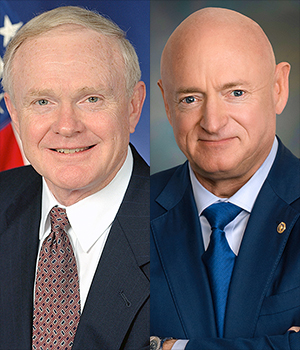
Roy Bridges (at left) and Senator Mark Kelly are the 2023 inductees in the U.S. Astronaut Hall of Fame. (NASA/U.S. Senate)
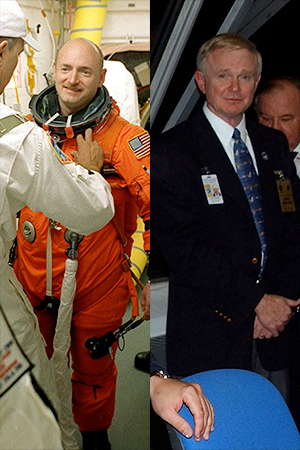
Mark Kelly (at left) prepares to board space shuttle Endeavour and Kennedy Space Center director (and former astronaut) Roy Bridges is seen in the control center after the STS-108 launch. (NASA)
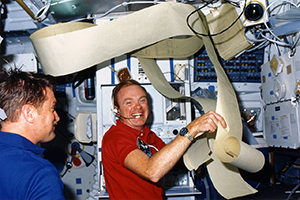
STS-51F pilot Roy Bridges is surrounded by some of the prolific teleprinter copy transmitted from ground controllers to the space shuttle Challenger in July 1985. (NASA)
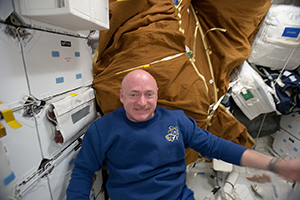
STS-134 commander Mark Kelly is surrounded by cargo bags on board the middeck of space shuttle Endeavour while docked with the International Space Station in May 2011. (NASA)
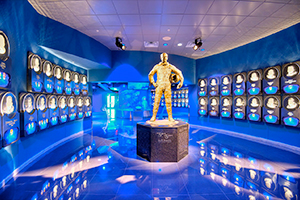
A statue of Alan Shepard, the first American to fly in space, stands in the U.S. Astronaut Hall of Fame, inside Heroes & Legends at the Kennedy Space Center Visitor Complex in Florida. (KSCVC) |
